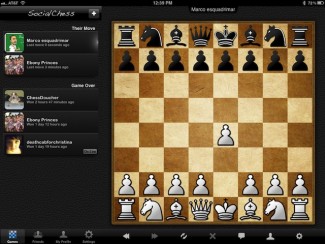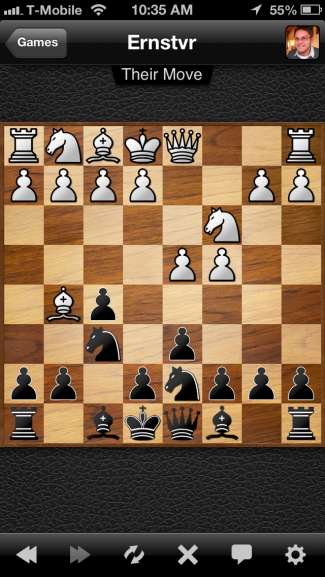Bastion
LQ: 9.15
Recommended Age: 10+
Skills Used: Planning, Working Memory, Mathematics, Reading

Social Chess is a competitive and educational chess learning app. Though not as robust as Chess.com’s app, Social Chess focuses solely on gameplay. Players can compete against friends, the computer, random opponents of similar ability, or even themselves. Social Chess uses a win/loss algorithm to calculate players’ Elo rating, which allows the app to find suitable opponents and helps users to track their progress. Social Chess’ paid version provides users with Elo charts, opponent win/loss stats, and much more. For chess enthusiasts, it’s worth the upgrade. As a game, chess helps develop nearly every thinking skill, as it tasks the mental capacities of each player to the fullest. The app accomplishes the same. For players who have a passion for learning, winning, tactics, or an affinity for spacial thought, Social Chess is the app for you. We recommend Social Chess to players 4 and up, like the game itself.
Teachers: check out the classroom guide!
THIS GAME IS GOOD FOR KIDS WHO NEED HELP WITH:
Working Memory
 A good memory can make it easier for players to recognize where they went wrong in past games, helping them make crucial positional and/or tactical changes to their style. First, it’s important for players to memorize the letter and number of each of the 64 squares on the board. There are many, many different openings or white and for black. It’s equally important for players to commit at least the first few moves, as well as their most popular variations to memory. Of course, it’s better that understand why those moves are made. But for the sake of the working memory, memorization works just fine.
A good memory can make it easier for players to recognize where they went wrong in past games, helping them make crucial positional and/or tactical changes to their style. First, it’s important for players to memorize the letter and number of each of the 64 squares on the board. There are many, many different openings or white and for black. It’s equally important for players to commit at least the first few moves, as well as their most popular variations to memory. Of course, it’s better that understand why those moves are made. But for the sake of the working memory, memorization works just fine.
Focus
Social Chess requires intense attention to detail. That alone makes it a great asset to the Focus thinking skill. The app also takes into account goal-directed persistence, another major part of the thinking skill. Players can exercise goal directed persistence best during opening and middle-game play. If all goes according to plan, they should enter the end game up in material. If players make it to an endgame even up a pawn, they should consider the game a success, assuming they are not mated quickly due to bad position.
Flexibility
Players can opt for a “take back” once per game – if both players enable the function. Players who make a better move after a take back exemplify the flexibility thinking skill at work. This kind of application based learning will help players develop their chess and flexibility skills much more quickly as they’re allowed to learn from mistakes during play. Players who are allowed to take back a blunder should ask themselves why that move was bad and why they chose to move their piece to such a dangerous square. They should then begin to compile a mental list of other possible moves, highlighting the ones that would put them in better position or get them out of harm’s way.
Planning
 Very few players who begin a game haphazardly will become victorious. Players need an opening strategy. Usually the idea is to control the middle of the board. Players should do exactly that: move a pawn or knight to control a central square. From there players should try to accomplish the same with another pawn, a knight, or even a bishop. Not only must players begin with a plan, but each move should be planned. Players need to understand the repercussions for each move. Knowing an opponent’s next best move will allow careful players an advantage over an unwitting opponent.
Very few players who begin a game haphazardly will become victorious. Players need an opening strategy. Usually the idea is to control the middle of the board. Players should do exactly that: move a pawn or knight to control a central square. From there players should try to accomplish the same with another pawn, a knight, or even a bishop. Not only must players begin with a plan, but each move should be planned. Players need to understand the repercussions for each move. Knowing an opponent’s next best move will allow careful players an advantage over an unwitting opponent.
Self-Control
It might be difficult for players to resists the temptations to wildly take material or to habitually check the King. However, be sure not to fall into a trap. In fact, it might be helpful to watch a few YouTube video about traps so that players know what to look out for. In chess, impulsive moves are usually bad moves. Unless of course the player in gifted with Chess intuition. Assuming the player is now, it’s crucial to do a few calculations. Simple calculation will help players avoid blundering away material due to a series of quick, poor moves.
All membership plans come with full access to our entire suite of tools learning guides, and resources. Here are a few of the ones we think you’ll like the most: